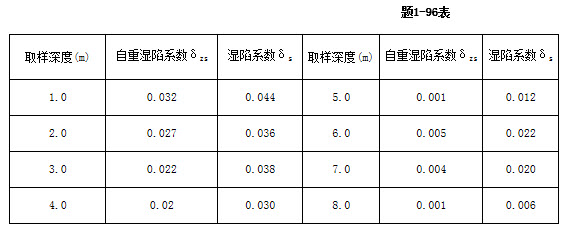某一黄土场地进行初步勘察,在一探井中取样进行湿陷性试验,结果见表。试计算黄土的总湿陷量△s(β0=0.5,不考虑地质分层)。

参考答案:
δs<0.015为非湿性黄土,δs<0.015的土层不累计。
自重湿陷量的计算值△zs,从自然地面起算,对δzs<0.015的土层不累计

△zs=5.85cm<7cm,属非自重湿陷性黄土。
计算总湿陷量△s,从地面下1.5m算至基底下5m,即地面下1.5~6.5m,β取1.5。

=1.5×10.4=15.6cm
某一黄土场地进行初步勘察,在一探井中取样进行湿陷性试验,结果见表。试计算黄土的总湿陷量△s(β0=0.5,不考虑地质分层)。

参考答案:
δs<0.015为非湿性黄土,δs<0.015的土层不累计。
自重湿陷量的计算值△zs,从自然地面起算,对δzs<0.015的土层不累计

△zs=5.85cm<7cm,属非自重湿陷性黄土。
计算总湿陷量△s,从地面下1.5m算至基底下5m,即地面下1.5~6.5m,β取1.5。

=1.5×10.4=15.6cm